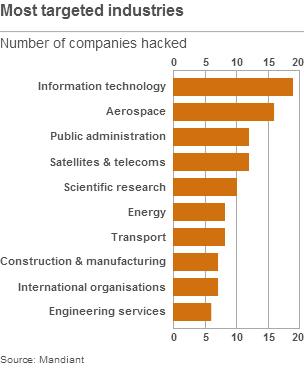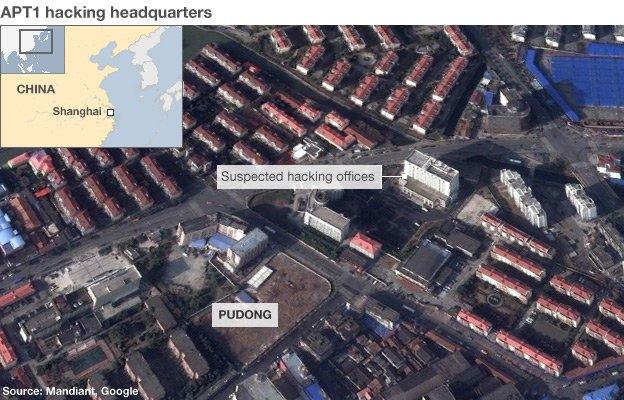White House vows to fight trade-secrets theft
- Published
The BBC's John Sudworth was detained while filming the reported hub of the hacking operation
The White House has vowed to fight foreign theft of US trade secrets, a day after a report linked China's military to prolific cyber-theft.
The administration's strategy document warned that such activity threatened US economic and national security.
The US says it has repeatedly raised concerns with China about cyber-attacks and stolen trade data.
China's military says Tuesday's report by a US-based security company was flawed and lacked "technical proof".
The White House strategy document unveiled on Wednesday, external urges greater co-ordination among different government agencies.
It also calls for the private sector to be better informed about the risk of trade-secrets theft and for stepping up intelligence and law enforcement efforts.
'Jobs at risk'
"We will continue to act vigorously to combat the theft of US trade secrets that could be used by foreign companies or foreign governments to gain an unfair economic edge," said the strategy document.

"Trade secret theft threatens American businesses, undermines national security, and places the security of the US economy in jeopardy". Such actions, it said, "put American jobs at risk".
The plan was unveiled by US Attorney General Eric Holder and by Victoria Espinel, the administration's Intellectual Property Enforcement Co-ordinator.
Tuesday's detailed report by Mandiant, external identified a Shanghai high-rise used by China's military as the probable home of hackers to whom it attributed multiple attacks on US companies.
The group, labelled in the report as APT1, was staffed by hundreds of proficient English speakers.
APT1 had hacked into 141 companies across 20 industries, stealing hundreds of terabytes of information including blueprints, business plans, pricing documents, user credentials, emails and contact lists.
China's government has long been suspected of a role in cyber-hacking.
But the issue has become more high-profile in recent months following widely reported hacks into media outlets including the New York Times.
That incident followed the newspaper's report on the wealth of outgoing Premier Wen Jiabao's relatives.
On Tuesday, state department spokeswoman Victoria Nuland said that the issue had come up "in virtually every meeting we have with Chinese officials".
Estimated losses from cyber-espionage and theft of trade secrets totalled more than $300bn (£195bn) in 2012, according to Dutch Ruppersberger, the top Democrat on the House Intelligence Committee.
On Wednesday, Chinese foreign minister Hong Lei said China itself had been the victim of attacks, citing a 2012 report from the country's Ministry of Information Technology and Industry.
"Among the above attacks, those from the US numbered the most,'' he said at a news conference.
Cyber-security experts told the Associated Press that US intelligence agencies routinely spy on other countries, but do not conduct similar attacks or steal data from Chinese companies.

- Published20 February 2013
- Published19 February 2013
- Published19 February 2013
- Published19 February 2013
- Published31 January 2013
- Published31 January 2013
- Published31 January 2013
- Published26 October 2012
- Published20 March 2012